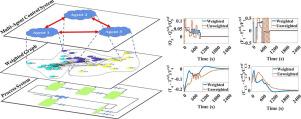Multi-agent distributed control of integrated process networks using an adaptive community detection approach
IF 4.1
Q2 ENGINEERING, CHEMICAL
引用次数: 0
Abstract
This paper focuses on developing an adaptive system decomposition approach for multi-agent distributed model predictive control (DMPC) of integrated process networks. The proposed system decomposition employs a refined spectral community detection method to construct an optimal distributed control framework based on the weighted graph representation of the state space process model. The resulting distributed architecture assigns controlled outputs and manipulated inputs to controller agents and delineates their interactions. The decomposition evolves as the process network undergoes various operating conditions, enabling adjustments in the distributed architecture and DMPC design. This adaptive architecture enhances the closed-loop performance and robustness of DMPC systems. The effectiveness of the multi-agent distributed control approach is investigated for a benchmark benzene alkylation process under two distinct operating conditions characterized by medium and low recycle ratios. Simulation results demonstrate that adaptive decompositions derived through spectral community detection, utilizing weighted graph representations, outperform the commonly employed unweighted hierarchical community detection-based system decompositions in terms of closed-loop performance and computational efficiency.

使用自适应群落检测方法对集成流程网络进行多代理分布式控制
本文主要针对集成过程网络的多代理分布式模型预测控制(DMPC)开发一种自适应系统分解方法。所提出的系统分解方法采用了一种精炼的谱群检测方法,以状态空间过程模型的加权图表示为基础,构建了一个最优分布式控制框架。由此产生的分布式架构将受控输出和操纵输入分配给控制器代理,并划定它们之间的交互关系。随着过程网络经历不同的运行条件,分解也会发生变化,从而对分布式架构和 DMPC 设计进行调整。这种自适应架构提高了 DMPC 系统的闭环性能和鲁棒性。在以中循环比和低循环比为特征的两种不同运行条件下,对基准苯烷基化工艺的多代理分布式控制方法的有效性进行了研究。仿真结果表明,通过光谱群落检测得出的自适应分解利用加权图表示法,在闭环性能和计算效率方面优于常用的基于群落检测的非加权分层系统分解。
本文章由计算机程序翻译,如有差异,请以英文原文为准。
求助全文
约1分钟内获得全文
求助全文

 求助内容:
求助内容: 应助结果提醒方式:
应助结果提醒方式:


